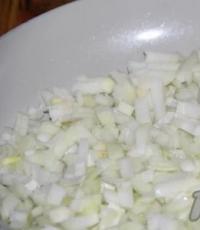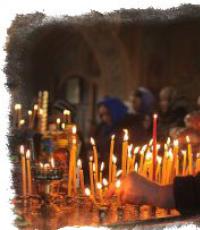Philip Stepanovich Shkulev. Biography. Biography of Shulev f. with Roslavlev Alexander Stepanovich
Philip Stepanovich Shkulev(1868-1930) - Russian poet. Author of the lyrics of the song "We, the Blacksmiths" (1905). Nicknames: Evil Satyr, Fish Shepherd.
Biography
Born on November 4 (16), 1868 in the village of Pechatniki, Moscow province, into a peasant family. His father died of cholera two months before he was born.
At the age of nine, Philip was sent to a textile factory, where he injured his right hand in a machine and remained disabled (he wrote with his left hand). In 1881-1890 he worked as a boy in a vegetable shop in Moscow. His education was two months at a parochial school.
He published his first poems in 1890 and was published in comradely collections of ordinary people from the people. His first book was published in 1895 and was called “The Thoughts of a Ploughman.” In 1905, together with M. L. Leonov (father of the writer L. M. Leonov), he opened a bookstore and book publishing house “Iskra” on Tverskoy Boulevard, which were closed in 1906. Participated in the December armed uprising in Moscow.
In 1911, the Moscow Court of Justice was sentenced under Article 129 for editing the magazine "Narodny Rozhok". by 6 months solitary imprisonment, which he served in Taganskaya prison, where he read (read poems by P. Yakubovich, “The American Republic” by D. Brice, “Gallery of French Celebrities” by Rusanov).
With the onset of the war, he was threatened with deportation to Narym, but he fled to Arkhangelsk, where he lived until the February Revolution. From 1907 to 1917 he acted as a satirist and editor of the satirical magazines “Thunderstorm” and “People's Horn”.
After the February Revolution, he was engaged in social activities - he was the chairman of the volost zemstvo in Pechatniki. Since 1918 - member of the RCP (b), chairman of the volost party committee, secretary of the party cell, military commissar, judge. At the same time, he continued to publish in the newspapers “Bednota”, “Working Moscow”, magazines and collections of proletarian poetry “Kommunar”, “Forge”, “Chernozem”, “Working Spring”, “Poetry of Working Professions” and other publications. He also participated in the literary movement, was a member of the literary association “Forge” and an honorary member of the literary group “Working Spring”. Shkulev's poems were published several times in Moscow in separate collections. In 1930, a solemn celebration of the poet took place in Moscow in connection with the 40th anniversary of his creative activity.
Memory
- A street in Moscow was named in honor of F. S. Shkulev. Also, until 1968, Lisichanskaya Street in Moscow bore his name.
- The poet's museum is located in Moscow school No. 773 (18 Polbina Street); There is a memorial plaque on the building, installed in 1970 with the inscription: “The poet F. S. Shkulev lived and died here.”
- In the Leninsky district of the Moscow region there is a literary association named after Shkulev (the city of Vidnoye).
Bibliography
- Shkulev F. Plowman's Duma. M., 1895
- Shkulev F. Not everyone is happy. M., 1902
- Shkulev F. Who is to blame? M., 1903
- Shkulev F. Hymn to Labor. M., 1922
- Shkulev F. Blacksmiths. M.-Pg., 1923
- Shkulev F. The keys to happiness. M., 1960
- Shkulev F. Poems. M., 1973
Shkulev, Philip Stepanovich
(1868-1930) - one of the first representatives of proletarian poetry in Russia. The son of a poor peasant woman. Sh.'s first poems were published in the collection. "Our Hut" in 1890, and then began to appear frequently in periodicals and brought the author wide popularity. The poem “The Blacksmiths,” set to music, is especially famous: it is sung by the proletarian masses. A participant in barricade battles during the uprising of 1905, Sh. in 1912 collaborated in the Bolshevik periodicals Zvezda and Pravda. For editing revolutionary magazines and printing political pamphlets, he was arrested, served 6 months, and then was forced to leave for Arkhangelsk, where he stayed until the February Revolution. In 1918 he became a member of the RCP(b). - Sh.’s poetry reflected the development of self-awareness of the Russian working class. His first works were strongly influenced by the sentiments of the workers of the late 19th century associated with the countryside; at this time the poet has a sharply negative attitude towards work in the factory; his aspirations are still vague, he dreams of a “bright destiny”, but does not know the path to it. With the growth of the revolutionary movement, the poet's class vigilance increases. He realizes that the “better share” is the work of the workers themselves. These motives sound especially strong in the poems of the period of the first revolution of 1905. The attitude towards the factory also changes - labor is glorified by the poet as a uniting principle for the struggle. After the October Revolution, Sh. actively participated in the proletarian literary movement and published a number of poems glorifying the proletarian revolution. Shkulev’s poems were published several times in separate collections: “Not everyone is happy,” M., 1902; "Who is to Blame", M., 1904; "Brave Songs", M., 1911; "Hymn to Labor", M., 1922; Ada Negri's poems were published in Sh.'s translation, M., 1904.
Lit.: Fritsche V. M., Proletarian poetry, Moscow, 1918; Boychevsky V., F. S. Shkulev, “Soviet Land”, M.-L., 1930, No. 10-11.
- - King of France in 1830-1848. Son of the Duke of Orleans Louis-Philippe and Adelaide of Bourbon-Pentievre, J.: from 1809 Maria Amelia, daughter of King Ferdinand I of Sicily ...
All the monarchs of the world
- - French king. Head of the junior line of the Bourbon dynasty. During the French...
Soviet historical encyclopedia
- - attack pilot, Hero of the Soviet Union, guard major. Participant of the Great Patriotic War since 1942. Fought in the 504th regiment, was a flight commander...
Large biographical encyclopedia
- - the professor is right in the cadet. bldg....
Large biographical encyclopedia
- - extremely. sent and Plenipotentiary, Minister in London...
Large biographical encyclopedia
- - let's modernize. translator...
Large biographical encyclopedia
- - a famous lexicographer, originally from Neuchâtel, Switzerland, in his youth he came to Russia as a home teacher, and, “while teaching others, he himself studied the Russian language and studied it thoroughly”...
Large biographical encyclopedia
- - one of the first representatives of proletarian poetry in Russia. The son of a poor peasant woman. Sh.'s first poems were published in the collection. "Our house"...
Large biographical encyclopedia
- - fighter pilot, Hero of the Soviet Union, lieutenant. Participant of the Great Patriotic War from the first day. He was the commander of the 131st IAP squadron. Made 167 combat missions, shot down 4 enemy aircraft...
Large biographical encyclopedia
- - Philip, saint - Metropolitan of Moscow and All Rus', in the world Fyodor Stepanovich Kolychev, was born in 1507. Belonging to one of the noble boyar families of the Moscow state, Fyodor Stepanovich began serving at court...
Biographical Dictionary
- - or, more correctly, Dyck, van Dutch. painter, nicknamed, in contrast to the famous Ant. van D., "Little V. D."...
Encyclopedic Dictionary of Brockhaus and Euphron
- - , French king in 1830-48. From a junior branch of the Bourbon dynasty...
- - Philippe Egalite Louis Philippe Joseph, French politician. Representative of the junior line of the Bourbons, Duke of Orleans...
Great Soviet Encyclopedia
- - Philippe Egalite Louis Philippe Joseph, Duke of Orleans, representative of the junior branch of the Bourbons. During the French Revolution at the end of the 18th century. renounced the title, took the surname Egalite...
- - PHILIPPE EGALITE Louis Philippe Joseph - representative of the junior branch of the Bourbons, Duke of Orleans. During the French Revolution of the late 18th century. renounced the title, took the surname Egalite...
Large encyclopedic dictionary
- - LOUIS PHILIPPE * Louis Philippe. Fr. King Louis Philippe. His nephew was wearing a blue cheviot suite. A high collar with a Louis Philippe tie propped up his narrow, slightly prominent chin. Bobor. Same breed...
Historical Dictionary of Gallicisms of the Russian Language
"Shkulev, Philip Stepanovich" in books
PIROGOV Grigory Stepanovich
author Fokin Pavel EvgenievichPIROGOV Grigory Stepanovich 12(24).1.1885 – 20.2.1931Russian singer (bass). In 1910–1921 at the Bolshoi Theater. Roles: Melnik (“Rusalka”), Tomsky (“Queen of Spades”), Gremin (“Eugene Onegin”) and others. “A bass of enormous power, filling and range, Grigory Pirogov shone not only with his voice, that is
ROSLAVLEV Alexander Stepanovich
From the book Silver Age. Portrait gallery of cultural heroes of the turn of the 19th–20th centuries. Volume 2. K-R author Fokin Pavel EvgenievichROSLAVLEV Alexander Stepanovich pseudo. Bayan;1(13).3.1883 – 11/10/1920Poet, prose writer. Publications in the magazines “Awakening”, “Satyricon” and others. Poetry collections “Visions” (Moscow, 1902), “Red Songs” (Yalta, 1906), “In the Tower” (St. Petersburg, 1907), “Carousels” ( St. Petersburg, 1910), “Tsevnitsa” (St. Petersburg, 1912). “Alexander
Chapter 14 Viktor Shkulev “NASNETTE FILIPACCHI SHKULEV”
From the book MultiMILLIONAIRES author Lenina LenaChapter 14 Viktor Shkulev “NASNETTE FILIPACCHI SHKULEV” Chapter about how Komsomol workers became private entrepreneurs; about someone who sleeps little; about whose publications are read by 21 million people, as well as about who has been married for 26 yearsShkulev Viktor Mikhailovich - group leader
BUSHMANOV Nikolay Stepanovich
authorBUSHMANOV Nikolai Stepanovich Colonel of the RKKA Colonel of the ROAR Born on December 3, 1901 in the village of Olkhovsko-Ozerskoye, Olkhovsky district, Yekaterinburg province. Russian. From the employees. Participant in the Civil War. Took part in hostilities against units of the Siberian Army
SHATOV Nikolay Stepanovich
From the book Army Officer Corps by Lieutenant General A.A. Vlasov 1944-1945 author Alexandrov Kirill MikhailovichSHATOV Nikolai Stepanovich Colonel of the Red Army, Lieutenant Colonel of the Armed Forces of the KORR, Born on April 29, 1901 in the village of Shatov, Igumnovsky volost, Kotelnichesky district, Vyatka province. Russian. From middle peasants. In 1913 he graduated from a rural school in the village of Gostevo. In 1915 he graduated from two classes
VASILY STEPANOVYCH
From the book I - “The Voice” author Bereznyak Evgeniy StepanovichVASILY STEPANOVYCH All these years I really wanted to meet Vasily Stepanovich, my teacher at the intelligence school, to thank him for everything he did for us. After demobilization, I again became the head of the Lvov city administration, and then the head of the schools department
Philip IV - Juana and Philip I
From the book Scaliger's Matrix author Lopatin Vyacheslav AlekseevichPhilip IV - Juana and Philip I 1605 Birth of Philip 1479 Birth of Juana 126 Philip was born on April 8 and Juana on November 6. From Juana's birthday to Philip's birthday is 153 days. 1609 Expulsion of baptized Arabs from Spain 1492 Expulsion of Jews from Spain 117 1492 Date for Spain
“I’m not the same Viktor Stepanovich anymore”
From the author's book“I’m not the same Viktor Stepanovich anymore” It’s funny that in his very first public appearances, the acting. The prime minister began to say almost the same thing that he said in December 1992, when he became prime minister for the first time. According to him, among the priorities of the new government
Duke Stepanovich
From the book Encyclopedia of Slavic culture, writing and mythology author Kononenko Alexey AnatolievichDuke Stepanovich Duke, Duke is an epic character, a hero-hero who is mentioned in the Novgorod and Galician epics. His horse is winged, and out of three hundred arrows, three are set with precious stones. Duke not only beats “geese, white swans, gray ducks”, he kills “Russian land”
Demin Lev Stepanovich
From the book Great Soviet Encyclopedia (DE) by the author TSBDemin Lev Stepanovich Demin Lev Stepanovich (b. January 11, 1926, Moscow), USSR pilot-cosmonaut, colonel-engineer, Hero of the Soviet Union (1974), candidate of technical sciences (1963). Member of the CPSU since 1956. After graduating in 1956 from the Air Force Engineering Academy. N. E. Zhukovsky worked in
From the book Dictionary of Modern Quotes author Dushenko Konstantin VasilievichSHKULEV Philip Stepanovich (1868-1930), poet 71 We are blacksmiths, and our spirit is young, We forge the keys to happiness! Rise higher, heavy hammer, Knock harder on the steel chest. “Blacksmiths” (1906) Often performed: “... our heavy hammer." The melody, according to E. D. Uvarova, dates back to what was fashionable in the 1900s.
22. Philip goes and tells Andrew about this; and then Andrew and Philip tell Jesus about this.
From the book The Explanatory Bible. Volume 10 author Lopukhin Alexander22. Philip goes and tells Andrew about this; and then Andrew and Philip tell Jesus about this. Philip did not dare to report the desire of the Greeks to Christ himself. Firstly, he could be embarrassed here by the memory of the commandment given by Christ regarding the pagans (Matthew 10:5) and the word of Christ regarding
Shkulev, Philip Stepanovich(1868-1930), Russian poet.
Biography
Born on November 4, 1868 in the village of Pechatniki near Moscow into a poor peasant family, he grew up without a father, who died before his birth. After studying for several months at a parochial school, he was sent to a textile factory at the age of nine, where he crippled his right hand. He worked as a helper in a vegetable shop in Moscow, read a lot and wrote poetry. In 1890 on Sat. Our Hut published the poem On the Night of Ivan Kupala and poems on the Day of the Annunciation, was published in the friendly collections of writers from the people “Meteor”, “Native Field”, “Duma”, “Dreams”, “In Memory of N.A. Nekrasov”, “Initiation” ", "Forward", "Young Shoots", as well as in the periodicals "Native Speech", "Motherland", "Children's Friend", "Family and School", "Ant", "Young Russia", etc.
In 1895 he published his first poetry collection, Duma of a Plowman. In 1902, together with his comrades, he organized the Moscow Comradely Circle of Writers from the People (since 1903 - the Surikov Literary and Musical Circle). In 1904 in translation Shkuleva A book of poems by the Italian populist poet Ada Negri was published. In the poems Hymn to Labor (1904), Worker (1905), and others, he created a symbolic image of a heroic worker entering into combat with the moribund world of capitalism (“He is dark, powerful and dense. / A pair of bronze hands”). In 1905, together with M. Leonov (father of the writer L. Leonov), he organized the Iskra bookstore and its publishing house, which was soon closed for publishing revolutionary literature.
In 1905 Shkulev participated in the armed uprising in Moscow, fought on the barricades of Presnya. During these days, he created his famous poem Kuznetsy (“We are blacksmiths - and our spirit is young...”), published in 1906 in the Moscow weekly “Our Business” and soon became a popular revolutionary song (2nd ed. 1912, published in the newspaper "Nevskaya Zvezda", the circulation was arrested, a criminal case was initiated against the editor; 3rd edition 1923).
From the second half of the 1900s, actively continuing his literary and political activities, Shkulev acted as a satirist and editor of the newspapers “Novaya Pashnya”, “Russian Day”, “Molodaya Volya”, “Muzhitskaya Pravda”, “Narodnaya Pravda”, wrote feuilletons, parodies, ditties, fables in the magazines “Udal”, “Groza”, “My Horn”, etc. In 1911, he was sentenced to prison for publishing the magazine “People's Horn”. Fearing police persecution, he left for Arkhangelsk, where, having resumed cooperation with M. Leonov, he participated in his newspaper “Northern Morning” and published the satirical magazines “Splinter” and “Northern Sting”. In 1912 he was published in the newspapers “Zvezda” and “Pravda”, published the collection Brave Songs, the poem Marusino’s happiness, and in 1917 he published the “centuries-old story” One with a Bipod, and Seven with a Spoon, the anti-monarchist poem Nicholas in Hell.
Performing under many pseudonyms ( Bumblebee, Philip Bogatyr, Blacksmith Vakula, Lefty etc.), Shkulev created a diverse series of images of workers - a foundry worker and a farmer, a blacksmith and a weaver, a shoemaker and a telegraph operator, which, in fact, was the image of one aesthetic and ideological content - a simple and honest fellow, capable of deep feelings and furious anger, expressing his thoughts and feelings are juicy, unambiguous and bright.
After the February Revolution Shkulev- Chairman of the volost zemstvo in his native Pechatniki, after the October Revolution (in 1918 he joined the Bolshevik Party) - chairman of the volost party committee, secretary of the party cell, military commissar, judge. He continued to actively publish in newspapers (“Bednota”, “Working Moscow”, etc.), magazines and collections of proletarian poetry (“Kommunar”, “Forge”, “Chernozem” (1st and 2nd), “Working Spring” , “Poetry of working professions”, etc.).
In 1918 Shkulev wrote the Hymn of the Communards (first published in the collection Hymn to Labor, 1922), developing, like all of Shkulev’s post-revolutionary poetry, the marching tonality and rhythmic pressure of his Kuznetsov. A member of the association of proletarian writers “Kuznitsa”, an honorary member (since 1922) of the literary group “Workers’ Spring”, Shkulev willingly worked with aspiring poets from the workers. In 1929 he published his last lifetime collection, Kuznets. Labor songs, consolidating the characteristic both for himself and for the works of poets of his series of the late 19th - early 20th centuries. an ideological and imaginative system of values based on faith in the indispensable goodness of a person who does hard physical labor and moves the locomotive of history.
Shkulev died in Pechatniki near Moscow on November 16, 1930.
Shkulev Philip Stepanovich born in 1868 in the village of Pechatnikovo, Moscow province into a poor peasant family.
At the age of 10 he began working in a factory, but after injuring his right hand, he left the factory and went to work in a vegetable shop. Here, using my free time, I learned to read and write.
From the age of 15 he began to write poetry, imitating and.
In 1890, the first works of Philip Stepanovich appeared in print (the poem “On the Night of Ivan Kupala”, the poem “On the Day of the Annunciation” and others).
Since that time, Shkulev has constantly collaborated in various magazines and newspapers. Being the editor of the newspapers “Novaya Pashnya”, “Russian Day”, the magazines “Udal”, “Narodny Rozhok” and others, he gathers self-taught poets from the working and peasant masses around these publications.
Philip Stepanovich actively participated in the December armed uprising of 1905 in Moscow.
In 1912 he collaborated with the Bolshevik newspapers Zvezda and Pravda. For editing revolutionary magazines and printing political pamphlets, he was arrested in 1912 and imprisoned for 6 months. The October Revolution was greeted as the long-awaited liberation of the working masses from the shackles of capitalism and exploitation. After October, he actively participated in the proletarian literary movement.
In 1918 he joined the Communist Party.
In Soviet times, two collections of his poems were published: “Hymn to Labor” (1922), “Blacksmiths. Labor songs" (1923).
Early works Shkuleva full of complaints about the plight of the working people, hopes for the philanthropy of the owners of factories and factories, Christian humility and forgiveness. With the development of the labor movement, with the intensification of the class struggle in Russia, the political self-awareness of the working poet developed, and his proletarian worldview matured.
Poems by Shkulev F.S. liberated from Christian-pessimistic sentiments, the idea grows stronger in them that only in struggle will the people win their liberation. During the period of the first Russian revolution, he wrote a poem (1906), which became a popular folk song, especially widespread in the 20s and 30s.
The most important theme of creativity Shkulev Philip Stepanovich- the theme of labor; with love and deep respect he paints the image of a worker, a man of labor. The hard, exhausting work for the capitalist, depicted in the poet’s pre-revolutionary poems, gives way to the joyful hymn to liberated labor in the works he created after October.
Died in 1930 in Moscow.
Shkulev Philip Stepanovich was born in 1868 in the village of Pechatnikovo, Moscow province into a poor peasant family.
At the age of 10 he began working in a factory, but after injuring his right hand, he left the factory and went to work in a vegetable shop. Here, using my free time, I learned to read and write.
From the age of 15 he began to write poetry, imitating Nekrasov and Nadson.
In 1890, the first works of Philip Stepanovich appeared in print (the poem “On the Night of Ivan Kupala”, the poem “On the Day of the Annunciation” and others).
Since that time, Shkulev has been constantly collaborating
In various magazines and newspapers. Being the editor of the newspaper “Novaya Pashnya”, “Russian Day”, the magazines “Udal”, “Narodny Rozhok” and others, he gathers self-taught poets from the working and peasant masses around these publications.
Philip Stepanovich actively participated in the December armed uprising of 1905 in Moscow.
In 1912 he collaborated with the Bolshevik newspapers Zvezda and Pravda. For editing revolutionary magazines and printing political pamphlets, he was arrested in 1912 and imprisoned for 6 months. The October Revolution was greeted as the long-awaited liberation of the workers
The masses from the shackles of capitalism and exploitation. After October, he actively participated in the proletarian literary movement.
In 1918 he joined the Communist Party.
In Soviet times, two collections of his poems were published: “Hymn to Labor” (1922), “Blacksmiths. Labor songs” (1923).
Shkulev's early works are full of complaints about the plight of the working people, hopes for the philanthropy of the owners of factories and factories, Christian humility and forgiveness. With the development of the labor movement, with the intensification of the class struggle in Russia, the political self-awareness of the working poet developed, and his proletarian worldview matured.
The poems of F.S. Shkulev are freed from Christian-pessimistic sentiments; the idea that only in struggle will the people win their liberation becomes stronger in them. During the first Russian revolution, he wrote the poem “We are blacksmiths, and our spirit is young” (1906), which became a popular folk song, especially widespread in the 20s and 30s.
The most important theme of Philipp Stepanovich Shkulev’s work is the theme of labor; with love and deep respect he paints the image of a worker, a man of labor. The hard, exhausting work for the capitalist, depicted in the poet’s pre-revolutionary poems, gives way to the joyful hymn to liberated labor in the works he created after October.
Died in 1930 in Moscow.
(No Ratings Yet)
- ZHITKOV Boris Stepanovich (1882 - 1938) - Russian prose writer. Zhitkov was born near Novgorod and was the 4th child in the family. Father, Stepan Vasilyevich, worked as a mathematics teacher at the Novgorod teacher's school. Teacher...
- FRENCH LITERATURE Andre Maurois The Vicissitudes of Love (Climats) Novel (1928) The first part of the novel - “Odile” - was written on behalf of Philippe Marcin and addressed to Isabella de Chaverny. Philip wants to tell the truth...
- He was orphaned early and was raised by relatives in Simbirsk and Moscow. He studied at the Moscow University Noble Boarding School (1811-1812), then at Moscow University (1813-1817). Since 1811 he was enrolled in the Moscow archive of the Collegium of Foreign Affairs....
- (Abridged) Tale (1925) by M. A. Bulgakov >>> The action takes place in Moscow in the winter of 1924/25. Professor Philip Filippovich Preobrazhensky discovered a method of rejuvenating the body by transplanting endocrine glands of animals into people....
- Born into the family of military engineer Fyodor Grigorievich Shpalikov. In July 1955 he graduated from the Kiev Suvorov Military School, where he was sent in 1947 by the military registration and enlistment office of the Leningrad region. There, at the Suvorov Military School...
- GERMAN LITERATURE Johann Christoph Friedrich Schiller Don Karlos Infant von Spanien Dramatic poem (1783-1787) The action takes place in Spain in 1568, on...
- Verderevsky Vasily Evgrafovich comes from an old noble family. In 1819 he graduated from the Moscow University Noble Boarding School, and taught there until the end of 1819. In 1820-1824 he served in the Life Guards, until 1827 he was...
- In 1910, Gumilyov published the collection “Pearls”, including his previous book “Romantic Flowers” as a component part. Many fellow poets highly appreciated the work of Nikolai Stepanovich. The young poet received flattering...
- Born in 1895 in Moscow in the family of a pharmacist (according to other sources, the manager) of the Staro-Catherine Hospital (now the Moscow Regional Research Clinical Institute named after M. F. Vladimirsky). I started writing poetry...
- He was educated at the St. Petersburg 2nd Gymnasium, graduated from the Faculty of Law at St. Petersburg University in 1845 with a candidate's degree, and devoted himself to literary work. Not financially secure, he was from the first...
- Born in the village of Bludnovo, Vologda province, into a peasant family. The poet’s first mentors were teachers from a seven-year school and a pedagogical college in the regional town of Nikolsk, from which Alexander Yashin graduated in 1931. Printing...
- BORIS VIKTOROVICH SHERGIN (1893-1973) Born in 1893 in Arkhangelsk, died in 1973 in Moscow. Expert in Russian northern folklore. Several wonderful cartoons have been made based on his tales. That's what he...
- In August 1918, Anna Akhmatova divorced her first husband, the poet Nikolai Gumilev. They lived in marriage for about eight years. Their union gave the world a talented scientist-historian - Lev Gumilyov....
- Born into the family of a shoemaker, a descendant of peasants; In early childhood, he was left an orphan and studied at a real school, from which he was expelled due to a clash with the director. Lived in Moscow, Ufa and Odessa;...
- Born on March 21 (April 2), 1881 in Moscow. On his father’s side (Alexey Yegorovich) he belonged to the count family of Komarovsky (great-grandson of the memoirist General E.F. Komarovsky), on his mother’s side (Alexandra Vasilievna)...
- Pavelin Viktor Vasilyevich was born on February 8, 1929 in the village of Penkovo, Ivanovo region. Since 1948 - participated in the work of the Magnitogorsk Literary Association. 1949 – the poem “I Love the Motherland” was published in the newspaper “Magnitogorsk Worker”....
- FET (Shenshin) Afanasy Afanasyevich (1820-1892) - Russian poet. In September 1820, the Russian nobleman A. N. Shenshin took a young married lady, Charlotte Elizaveta Fet, from Darmstadt (Germany). expecting a child. IN...
- V. I. Annensky (pseudonym: Valentin Krivich) was born on June 20, 1880 in St. Petersburg, in the family of I. F. Annensky, who at that time held the modest post of teacher of ancient languages at the St. Petersburg gymnasium....
- KOLTSOV Alexey Vasilievich (1809 - 1842) - Russian poet. Koltsov was born in Voronezh, into a bourgeois family. His father was a livestock trader. The boy hardly had to go to school:...
- In 1912, Sergei Yesenin came to conquer Moscow, but luck did not immediately smile on the young poet. Several more years would pass before his first poem was published in a metropolitan magazine. Bye...
- Poor Demyan is the pseudonym of the proletarian poet Efim Alekseevich Pridvorov. Born in 1883 in the village of Gubovka, Alexandria district. Kherson province, in a peasant family (from military settlers), lived in Elizavetgrad until the age of 7...
- M.V. Isakovsky was born on January 7 (19), 1900 in the village of Glotovka (now Ugransky district, Smolensk region) into a poor peasant family. A local priest taught Isakovsky to read and write. Later Isakovsky...
- VLADIMIR GALAXIONOVICH KOROLENKO (1853-1921) Born in Zhitomir into the family of a district judge, he was fond of Russian classical literature, dreamed of becoming a lawyer to defend the disadvantaged. However, as a graduate of a real gymnasium, he did not have the right to enter...
- DRAGUNSKY Viktor Yuzefovich (1913-1972) - Russian prose writer. Dragunsky was born in New York, but spent almost his entire life in Moscow. He began his career early: at the age of 16 he was already working...
- Born on October 25 (November 5), 1733 in Pereyaslavl, Left Bank Ukraine (now Pereyaslav-Khmelnitsky in the Kyiv region of Ukraine). He came from a Wallachian family from the boyar family of Heresko. His father, Matvey Andreevich Kheraskov,...
- ZABOLOTSKY Nikolai Alekseevich (1903-1958) - Russian poet. Zabolotsky was born near Kazan, in the family of a land agronomist who worked on agricultural farms nearby. In the first years after the revolution, the family moved to Urzhum, where...
- Matveeva Novella Nikolaevna was born in Detskoe Selo (now the city of Pushkin), Leningrad region, in the family of geographer, local historian N. N. Matveev-Bodrogo and poetess N. T. Matveeva-Orleneva. Novella's grandfather, N.P. Matveev-Amursky, also...
- Born in 1873. After graduating from the Gymnasium, she was a telegraph operator for several years. In 1901 she was expelled from St. Petersburg. Since 1895, she published poems, stories and fairy tales in the “Picturesque Review”,...
- Livshits Benedict Konstantinovich was born on December 25, 1886 (January 6, 1887), in Odessa. Real name Naumovich. He studied at the Faculty of Law at Novorossiysk (Odessa) and Kiev Universities (graduated in 1912, then entered...
- Vera Inber was born on June 28 (July 10), 1890 in Odessa. Her father, Moses (Monya) Filippovich (Lipovich) Shpenzer, was the owner of a printing house and one of the leaders of the scientific publishing house “Matesis” (1904-1925). Mother...




